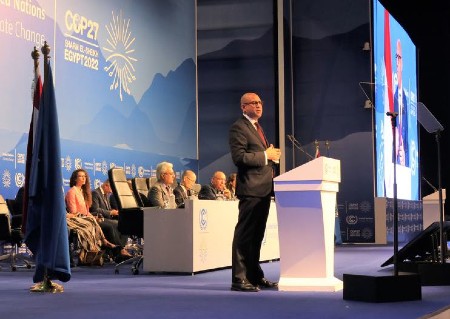UN Climate Chief Says Global Leaders Need to be Held Accountable for Climate Change Promises
SHARM EL SHEIKH, Egypt – Declaring himself an “accountability chief”, former Grenadian politician Simon Stiell who now serves as the UN climate chief said on Sunday as the Climate Change Conference (COP27) began here that leaders will be held accountable for promises they made at last year’s conference.
 Simon Stiell, the new Executive Secretary of the UN Climate Convention, addressing the opening ceremony of COP27.“Because our policies, our businesses, our infrastructure, our actions, be they personal or public, must be aligned with the Paris Agreement and with the [UN Climate] Convention,” he told delegates gathered at the Tonino Lamborghini International Convention Centre for COP27’s opening ceremony.
Simon Stiell, the new Executive Secretary of the UN Climate Convention, addressing the opening ceremony of COP27.“Because our policies, our businesses, our infrastructure, our actions, be they personal or public, must be aligned with the Paris Agreement and with the [UN Climate] Convention,” he told delegates gathered at the Tonino Lamborghini International Convention Centre for COP27’s opening ceremony.
Stiell, the new Executive Secretary of the UN Climate Convention (UNFCCC), said this year’s conference should shift the world towards implementation of previously agreed plans to tackle humanity’s greatest challenge.
“Today a new era begins and we begin to do things differently. Paris gave us the agreement. Katowice and Glasgow gave us the plan. Sharm el-Sheik shifts us to implementation. No one can be a mere passenger on this journey. This is the signal that times have changed,” he said.
Stiell reminded delegates that last year the Glasgow Climate Pact was agreed at COP26, and he expected them not to rescind their word.
“Stick to your commitments. Build on them here in Egypt. I will not be a custodian of back-sliding,” he said.
The UNFCCC convention entered into force on March 21, 1994 to prevent “dangerous” human interference with the climate system. Today, ratified by 198 countries, it has near-universal membership. The Paris Agreement, agreed in 2016, works as an extension of that convention.
Acknowledging the current complex geopolitical situation, Stiell said that COP27 is an opportunity to create a safe political space, shielded from whatever is going on “out there”, to work and deliver world change.
“Here in Sharm el-Sheikh, we have a duty to speed up our international efforts to turn words into actions,” he emphasized.
The UNFCCC Executive Secretary underlined three critical lines of action for the conference: demonstrate a transformation shift to implementation by putting negotiations into concrete actions; cement progress on the critical workstreams – mitigation, adaptation, finance and crucially – loss and damage; and enhance the delivery of the principles of transparency and accountability throughout the process.
“I welcome detailed plans on how we deliver what we have promised,” he told delegates.
Stiell stated that 29 countries have now come forward with tightened national climate plans since COP26, five more since the publication of last week’s UNFCCC NDC Synthesis report, but still not a majority.
“So here I am now, looking out at 170 countries that are due to be revisiting and strengthening their national pledges this year,” he said.
In words that drew an ovation in the plenary room, Stiell underscored that women and girls must be placed at the center of climate decision-making and action.
“Their empowerment leads to better governance and better outcomes,” he said, also highlighting the importance of civil society organizations and the youth in the COP27 process.
Alok Sharma, President of COP26 representing the United Kingdom, echoed Stiell, urging leaders to act, despite current geopolitical challenges.
“As challenging as our current moment is, inaction is myopic, and can only defer climate catastrophe, we must find the ability to focus on more than one thing at once,” he said.
COP27 President Sameh Shoukry called on delegates to scale up ambition and begin implementing the promises already made.
“Moving from negotiations and pledges to an era of implementation is a priority,” he said, later commending the countries which have already shared updated national climate plans.
Shoukry added that the $100 billion promised for adaptation by developed countries to developing countries should be delivered, and finance must also be at the centre of discussion.
“The negotiations [during the next two weeks] will hopefully be fruitful. I urge all of you to listen carefully and commit to implementation and to turn political commitments into agreements and understandings and texts and resolutions that we can all implement,” he underscored.
He also warned that “zero-sum games will have no winners” and that the implications of the negotiations will affect the lives and livelihoods of millions of people around the world suffering the impact of climate change.
“We cannot afford any negligence or shortcomings; we cannot threaten the future of upcoming generations,” he insisted.


